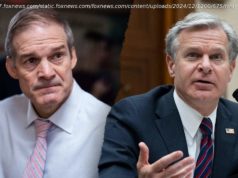President Trump’s decision to slap steep tariffs on steel and aluminum imports is fraying his relationship with congressional Republicans.
President Trump ‘s decision to slap steep tariffs on steel and aluminum imports is fraying his relationship with congressional Republicans.
GOP lawmakers had largely rallied behind the unconventional president, even though he does not always share in their ideology on issues like trade.
But Trump’s tariff announcement — which came despite frantic pleas from Republicans — dealt a stinging blow to many free trade Republicans and even some of the president’s own allies on Capitol Hill.
Some members are now contemplating legislative steps to block the president’s move.
“I think there’s a good chance that we will nullify them, at least if I have my way…. I generally support the president on just about everything but I think he’s been misled,” Sen. Orrin Hatch (R-Utah), the chairman of the Senate Finance Committee, told reporters. “I’m disappointed because we just passed a tax bill and this kind of flies in the face of that.”
GOP Sen. Jeff Flake (Ariz.), a frequent Trump critic who is retiring after 2018, is planning to introduce legislation to nullify the tariffs, saying Congress “cannot be complicit as the administration courts economic disaster.”
Libertarian-leaning GOP Sen. Mike Lee (Utah) has introduced legislation to give Congress oversight over any trade decision, including new tariffs. After Trump’s decision, he said he will work “to make sure these tax hikes are never enforced.”
Trump’s move to slap tariffs of 25 percent on steel and 10 percent on aluminum defies GOP orthodoxy, but isn’t a huge surprise given the president’s message from the 2016 campaign.
Republicans disappointed with the decision acknowledge it is consistent with Trump’s anti-Washington theme.
“The president’s got some ideas… and he feels like he’s made campaign promises and I think he wants to be able to deliver on those promises,” said GOP Sen. John Cornyn (R-Texas).
They also say they can still work with Trump.
“We need one another, and we’ve accomplished a lot together,” Rep. Tom Cole (R-Okla.) told The Hill. “We’ve got to be part of a team with the president, [rather] than at odds with him.”
“I’ve got a whole lot more in common with the president than any difference I might have,” Cole added.
Nonetheless, the level of disappointment is deep, and Republicans had worked hard to get Trump to reverse course.
A small group of lawmakers unsuccessfully tried to set up a last-minute meeting with the president, while over 100 Republicans signed onto a letter warning Trump about the economic consequences of the tariffs and raising concerns about a trade war.
Even some of Trump’s top allies, including House Freedom Caucus Chairman Mark Meadows (R-N. C.) and key lawmakers who helped deliver Trump’s tax cuts, were unable to change the president’s mind.
The tariff showdown represents a stark contrast from the beginning of the year, when Republicans were feeling united following their major tax-reform victory.
And more problems could emerge down the road.
Cornyn argued that lawmakers need to remain engaged as the administration threatens to walk away from the North American Free Trade Agreement. Economic adviser Gary Cohn’s exit and the rising influence of trade director Peter Navarro is also making Republicans nervous.
“We just need to stick close to the people that are talking to the president. I’m sorry to see Mr. Cohn leave and the ascent of Mr. Navarro… who has a lot of wrong ideas when it comes to trade. The president needs good advice,” Cornyn said Friday at an energy conference in Texas. He described himself as “concerned.”
Any legislation to fence in the White House would face an uphill battle because it has to be signed by Trump. That could require a bill to ultimately get two-thirds support in both chambers — a potentially herculean task for a GOP-controlled Congress against a Republican president.
It’s also unlikely that Speaker Paul Ryan (R-Wis.) or Senate Majority Leader Mitch McConnell (R-Ky.) would be willing to expend much political capital going head-to-head with a GOP president in a midterm election year.
Instead, GOP leaders have stressed that they want to work with Trump to help ensure the tariffs are more narrowly targeted.
“We will continue to urge the administration to narrow this policy so that it is focused only on those countries and practices that violate trade law,” Ryan said in a statement.
Cornyn, seeking to downplay the split, noted that the Bush administration also tried to levy similar tariffs and “you see in the news this wall to wall coverage about tariffs…. I think a sense of proportion is called for.”
“I think that we’re going to have to continue to work with the president and try to make advances where we can to try to convince him that… trade deficits aren’t the end all be all of determining if trading agreements are good,” he said.
Hatch, even while disagreeing with Trump, praised him and pointed the blame toward the president’s staff, accusing them of giving “bad advice.”
“If you explain things, he listens. He gets a hundred things a minute he has to solve and resolve so it’s not easy. But I have to say he’s smart,” he said.
Cole admitted that Trump’s tariff announcement caught many congressional Republicans by surprise, including members of GOP leadership.
But despite the rift over tariffs, Cole expressed a willingness to work with Trump in other areas of the agenda where they have common ground.
“It’s certainly not going to make it difficult for me to cooperate with him in other areas we agree,” Cole said.






